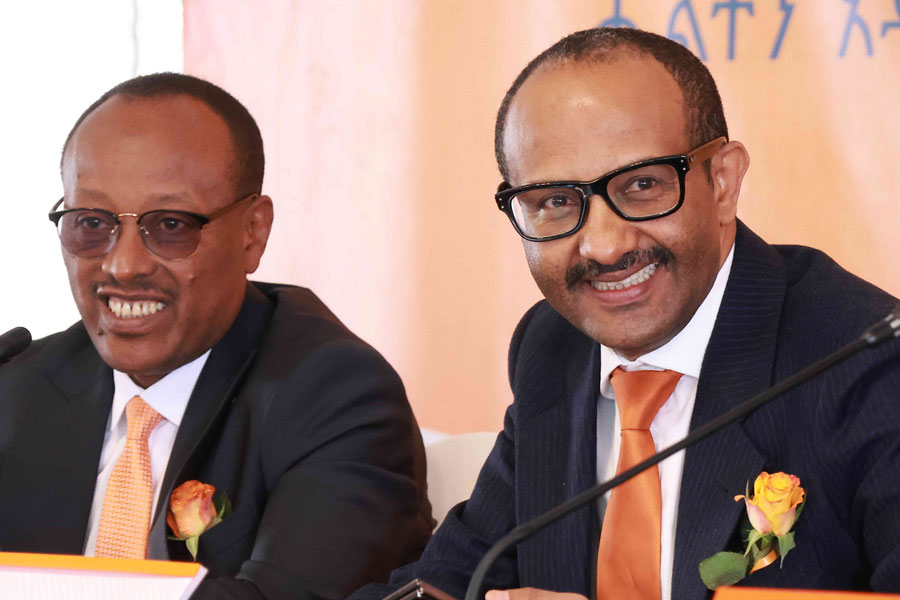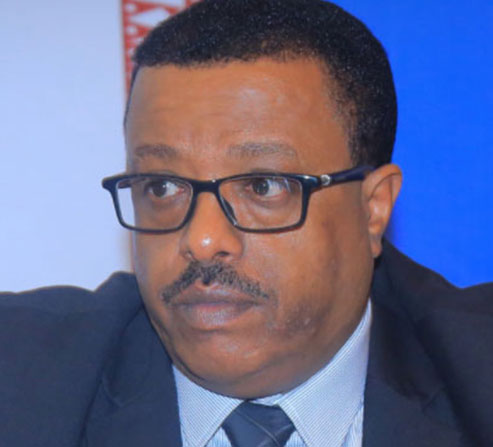
Radar | Apr 16,2022
Mar 1 , 2024.
In the corridors of the Ministry of Finance, on King George IV St., a recent visit by a World Bank delegation, led by Victoria Kwakwa, the vice president for East and South Africa, embodied more than a casual visit. During the discussions with key figures, including Finance Minister Ahmed Shidie, his deputy Eyob Tekalign (PhD), and Central Bank Governor Mamo Mihretu, the World Bank's message was unambiguous.
Ethiopia is on a fiscal cliffhanger; they must undertake substantial macroeconomic reforms to rejuvenate its partnership with the Bretton Woods institutions — the International Monetary Fund (IMF) and the World Bank.
The crux of the World Bank's counsel zeroes in on a series of economic reforms. The authorities need to enhance domestic revenue mobilisation, curb off-budget spending, reduce extravagant expenditures by public enterprises, and, most importantly, address the disparity between the official and parallel exchange rates. Given that the World Bank's International Development Association (IDA) accounts for a significant portion (41.4pc) of Ethiopia's external debt, totalling 28 billion dollars, the urgency of these reforms cannot be overstated.
David Malpass, the former World Bank President, had once jabbed Ethiopia's foreign exchange regime as not only costly but highly distortionary, correlating with elevated inflation rates. His position is echoed by the IMF, poised to negotiate a potential 3.5 billion dollar program to jump-start the faltering economy, contingent on the country's willingness to embrace tough reforms. No less will the World Bank inject (up to three billion dollars) into the economy, pending a successful conclusion of the talks with the IMF team scheduled to visit Addis Abeba at the end of this month. Its absence does not bode well for Minister Ahmed and his colleagues in the policy corridors.
Although Ethiopia's economy grew by 6.1pc in the 2022/23 fiscal year, its growth rate marks a slowdown from the double-digit growth rates of the previous decade. The deceleration can be attributed to impacts due to a mix of domestic conflicts, global geopolitical tensions, and a series of economic bottlenecks affecting sectors from electricity production to industrial output. The latter two have seen considerable reduction last year.
Particularly telling is the services sector, which, despite growing by 7.6pc, exposes an economy heavily reliant on public spending and vulnerable to fluctuations in the international prices of coffee (for export) and fuel (imports). Conversely, benefiting from favourable weather conditions and expanded cultivation, the agricultural sector posted a 6.1pc growth. Nonetheless, the industrial sector's sluggish performance, notably in construction and manufacturing, reflects deeper issues of foreign exchange scarcity and business environment risks primarily driven by political uncertainty and instability.
Investment trends should also raise alarms, with new investment spending plummeting to 25pc of GDP in 2022, a sharp decline from previous years. The reduction, which has seen no notable improvements in the subsequent year, is more pronounced in public investments. Despite efforts to manage debt and limit non-concessional borrowing, they should signal a cautious approach by both budgeted federal agencies and state enterprises.
The implications of reduced public investment should be profound, potentially capping long-term growth prospects at around five to six percent, sharply contrasting to the previous decade's double-digit rates. The vital role of investment in driving economic expansion should inform policymakers of the need for a strategic recalibration of their fiscal priorities. It should serve as a potent reminder that spending taxpayers' hard-earned money on museums, resorts, palaces and theatres has little economic returns, despite the narrative the official media tries to instil.
The duo from the IMF and World Bank are justified with their concerns that public investments away from social spending - particularly on defence - balloon the budget deficit to all-time high. The broad money growth - with an annual increase of 28pc of the GDP - can only expose Central Bank Governor Mamo's complicity in printing money to finance the growing deficit. Domestic revenue collection, the lowest in sub-Saharan Africa at below 10pc of GDP, cannot cover the deficit and bring fiscal stability. Coupled with a balance of payments deficit leading to dwindling foreign exchange reserves, the economic landscape presents a precarious balancing act for policymakers.
Their most prominent and immediate worry remains inflation. It is undoubtedly their most daunting challenge, with official rates averaging above 30pc in 2023. Alternate estimates by Steve Hank of Johns Hopkins University, who monitors inflation across economies, placed the inflation rate at a staggering 67pc in February this year, reminding the severity of price surges across non-food sectors. Such inflationary pressures are exacerbated by expansionary fiscal and monetary policies, with fiscal management revealing significant deficits and a worrying shift towards domestic debt.
The visit by the IMF and the World Bank should persuade the authorities to realise - if not internalise - the deep waters of the macroeconomic bombshell in their hands. It should wake them up from the policy slumberland that the underlying issues extend beyond conventional economic reforms. Marked by wars, insurgencies, violent conflicts, violations of fundamental rights, and a lack of the rule of law, it casts a long shadow over Ethiopia’s economic prospects.
The World Justice Project's rankings, which place Ethiopia low on respect for fundamental rights and regulatory enforcement, suggest a deep-seated crisis transcending economic policy. The decline in exports and the precarious state of forex reserves are symptomatic of broader governance and security issues that deter investment and stifle growth.
Traditionally more concerned with markets than military manoeuvres, economists have turned their analytical prowess towards understanding the intertwining of conflict and economic dynamics. Armed with comprehensive datasets that span decades and continents, researchers looked into violent conflicts from the jungles of Vietnam to the deserts of the Middle East and, recently, the Russian invasion of Ukraine.
Emerging from this wealth of data is a picture that challenges the adage that "war is good for business." The destruction wrought by conflict cannot be offset by the temporary upticks in employment or production that wartime economies might experience. The real costs of war, encompassing the immediate loss of life and infrastructure and the long-term impacts on economic development, are profound. Countries ensnared in conflict - like Ethiopia is today - display marked underperformance in both production and consumption, an enduring scars that warfare leaves on societies.
Economic and political freedoms are catalysts for growth; competent governance structures are indispensable for stability. The path to prosperity can only be paved with policies that enhance liberty, encourage trade, and promote human and physical capital investments. Avoiding the siren call of militarism that has characterised public discourse since the civil war broke out in Tigray, investing in constitutional institutions, and nurturing the conditions for peace and economic freedom are imperatives for societies aspiring to break the cycle of poverty.
Ethiopia's complex backdrop should call international financiers to press Ethiopia's leaders to balance economic reforms with pressing political and social realities. The economic plight is as much about governance and security as it is about fiscal and monetary policy changes. The emphasis on structural reforms, including forex liberalisation and market-led economic policies, should be complemented by a resolve to address governance, rule of law, human rights concerns and social cohesion.
The Bretton Woods institutions' push for reforms should realise this and go beyond conventional economic policy prescriptions. The choices made by Ethiopia's policymakers will determine the country's economic course. The imperative for reform is clear, but the scope of these reforms must extend beyond the economic domain that underpins enduring peace. In the face of these challenges, the World Bank and IMF's role as catalysts for change is more crucial than ever, offering a blueprint for a stable and equitable Ethiopia.
PUBLISHED ON
Mar 01,2024 [ VOL
24 , NO
1244]

Radar | Apr 16,2022

News Analysis | Jan 19,2024

Radar | Mar 27,2021

Exclusive Interviews | Jan 07,2024

Fortune News | May 23,2021

Photo Gallery | 176979 Views | May 06,2019

Photo Gallery | 167195 Views | Apr 26,2019

Photo Gallery | 157777 Views | Oct 06,2021

My Opinion | 136945 Views | Aug 14,2021

Dec 22 , 2024 . By TIZITA SHEWAFERAW
Charged with transforming colossal state-owned enterprises into modern and competitiv...

Aug 18 , 2024 . By AKSAH ITALO
Although predictable Yonas Zerihun's job in the ride-hailing service is not immune to...

Jul 28 , 2024 . By TIZITA SHEWAFERAW
Unhabitual, perhaps too many, Samuel Gebreyohannes, 38, used to occasionally enjoy a couple of beers at breakfast. However, he recently swit...

Jul 13 , 2024 . By AKSAH ITALO
Investors who rely on tractors, trucks, and field vehicles for commuting, transporting commodities, and f...

Oct 18 , 2025 . By NAHOM AYELE
In a sweeping reform that upends nearly a decade of uniform health insurance contribu...

A bill that could transform the nutritional state sits in a limbo, even as the countr...

Oct 18 , 2025 . By SURAFEL MULUGETA
A long-planned directive to curb carbon emissions from fossil-fuel-powered vehicles h...

Oct 18 , 2025 . By BEZAWIT HULUAGER
Transaction advisors working with companies that hold over a quarter of a billion Bir...